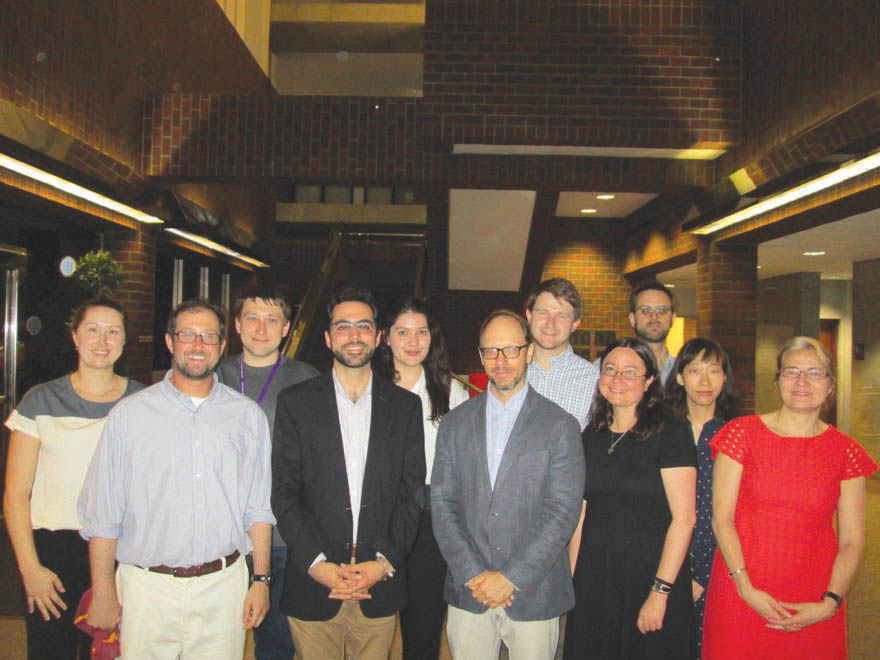
Staff Report
The Fresno Institute for Classical Armenian Translation (FICAT) hosted nine students from around the world last summer for a two-week intensive reading seminar. This unique program was led by Dr. Sergio La Porta, Haig and Isabel Berberian Professor of Armenian Studies, at Fresno State, and Dr. Michael Pifer, a lecturer at the University of Michigan, Ann Arbor. Participating were Liza Anderson (Claremont School of Theology); Seonyoung Kim (Hannim Biblical Institute, South Korea); Marina Bazzani (Oxford University, United Kingdom); Erin Piñon (Princeton); Jesse Izzon (Quinnipiac College); Jimmy Wolfe (The Ohio University); Kayla Dang (Yale University); Sundar Henny (University of Berne, Switzerland); and Michael Burling (University of Birmingham, United Kingdom). The program was made possible thanks to the generous support of the Fresno State Office of the President and the Armenian Studies Program.
The seminar focused on the production of high-quality translations of texts that are important to the students’ research. Students prepared their translations of texts that were circulated beforehand to the group. During the seminar they then jointly worked on the meaning of each text. In this manner, the students were exposed to a wide variety of texts and each participant received critical feedback to perfect their translation.
The texts presented covered different genres and periods of literature from late antiquity to early modernity and included: The Epic Histories attributed to P‘awstos, Eznik’s Against the Sects, Ghazar P‘arpets‘i’s History, Penitence of Adam, Aphrahat’s Demonstrations, Grigor Narekats‘i’s Book of Lamentation, Nersēs Shnorhali’s Hymn for Vardanants‘, Grigor Aknerts‘i’s History of the Nation of Archers, and Tēr Yovhanniseants‘’s History of Jerusalem.
On Tuesday, June 12, students presented short summaries of their research to the broader Armenian community at a public lecture. The overall presentation, “Classical Armenian in the 21st Century: Why Armenian Sources Matter to Students Today,” was moderated by Drs. La Porta and Pifer.
During their stay students enjoyed a dinner hosted by President Dr. Joseph and Mrs. Mary Castro at the University House, attended by members of the President’s Armenian Leadership Council. Students were also able to take advantage of being in Fresno to meet other Armenologists, experience the Divine Liturgy of the Armenian Church, sample Armenian cuisine, and witness the majesty of Yosemite National Park.
The leaders of the seminar were immensely pleased with how the two weeks developed and took pleasure in seeing the students continue to improve their ability in Classical Armenian, but the students also shared their positive feedback after the seminar. A brief sample from some of the students follows.
“As a result of the time spent in Fresno my understanding of classical Armenian and my knowledge of Armenian history and culture have increased enormously.… This year’s seminar has been truly successful, and I am very grateful to Fresno State, the Fresno Armenian community, and our instructors for making it happen!”
“This year’s seminar has given me a springboard into my dissertation research, but studying Classical Armenian has enriched my research on the religions of the ancient Near East in ways that I never could have expected.”
“The program challenged my colleagues and I to broaden our knowledge of Armenian culture, history, and the evolution of Classical Armenian over a span of more than a millennium.”
“Dr. La Porta and Dr. Pifer are dedicated instructors, whose leadership and guidance extend far beyond the classroom. They are invested in our growth as scholars and professionals, whose insight and experience is evident in their teaching.”
The impact these future scholars will have on the field and on academia in general will even further enhance the legacy of the Armenian Studies Program and the Fresno Armenian community whose support has made it possible.
 Hye Sharzhoom Armenian Action
Hye Sharzhoom Armenian Action